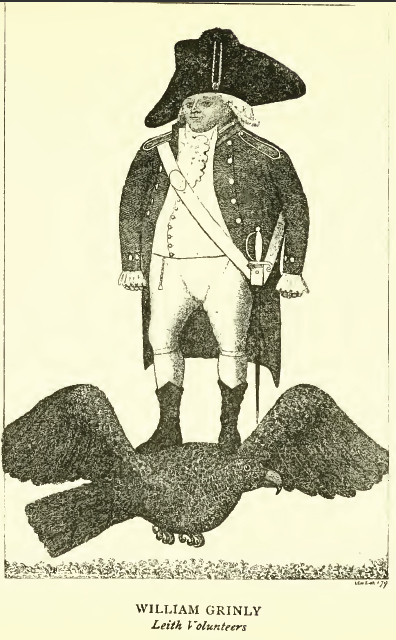The Royal Leith Volunteers, of which corps this
gentleman was Quartermaster, were embodied in 1795, and received their
colours on the 26th September of that year. The regiment was drawn up on
the Links—a detachment of the Royal Edinburgh Volunteers being present
to keep the ground—when, shortly after one o'clock, the Lord-Lieutenant,
attended by some of the Deputy-Lieutenants, arrived on the held, and
presented the colours to Captain Bruce, the Commandant, who delivered
them to two ensigns. The ceremony concluded with a prayer by the
chaplain, the Rev. Mr. Macknight.

Mr. Grinly was originally a merchant and shipowner at
Borrowstounness, the place of his nativity, where his father and three
brothers were respectable shipmasters. In early life, he had frequently
gone supercargo to Holland, France, Spain, Russia, and America, and was
no stranger to the vicissitudes attendant on a "life at sea," having
been twice captured by privateers of the latter country, and as often
experienced shipwreck. The Isabella—a fine new ship, homeward
bound, with a valuable cargo—was one of the vessels taken by the enemy.
The ship's company, after being robbed, were put on shore, and Mr.
Grinly was stripped of everything save his watch. One of the cases of
shipwreck alluded to occurred in a storm on the coast of France, when
the crew narrowly escaped with their lives, and the ship and cargo were
totally lost.
In 1773, he was presented with the freedom of the
burgh of Kirkcudbright, for his active exertions in conducting certain
transactions for the interest of that community. Finding himself less
successful than had accorded with his spirit of enterprise, he left
Borrowstounness, and proceeded from thence to Ireland, to establish a
branch of business there; but, after a stay of a little more than two
years, he again returned to Scotland, and arriving in Leith, had the
advantage of being received by relatives, friends, and mercantile
correspondents of the first respectability. Here he entered warmly into
the spirit of commerce, and for a series of years was most successful in
his transactions; but ultimately speculating too deeply in shipping and
underwriting, lie lost, in a few unfortunate reverses, nearly all the
wealth he had so industriously acquired. His misfortunes were well
calculated to overwhelm a less buoyant spirit; but instead of indulging
in unavailing regrets, he quickly set about repairing his broken fortune
by commencing the world anew as a broker and merchant. In this line his
exertions were again crowned with success, insomuch that he was latterly
enabled to retire altogether from business.
Mr. Grinly was short in stature, had a well-formed
and intelligent countenance, always dressed neatly, and was particularly
smart in his appearance. His habits were of an active, bustling
description; yet, possessed of a happy, cheerful disposition, he was
equally fitted to enjoy and promote the pleasures of social intercourse.
When the Russian fleet lay in the Roads of Leith, he frequently met with
the officers, Ms former connection with Russia, and his knowledge of the
country rendering his company peculiarly acceptable to them. The
soubriqriet of the "Spread Eagle" originated with a satirical person
of the name of M'Lean, merchant in Leith, at whose suggestion the
caricature was taken by Kay, at a field-day of the Leith Volunteers.
Several amusing anecdotes are told of Mr. Grinly. At
a sale of mahogany, where he officiated as auctioneer, a wealthy
tradesman from Edinburgh, whose violent temper often brought him into
trouble, was exceedingly chagrined, after having purchased to a
considerable extent, to find a choice lot knocked down to a rival in
trade. Unable to contain his choler, he called out to Mr. Grinly, in a
loud and angry voice—"Sir, I challenge you to exchange pistols with me
at the back of the wall." "Hurry home," said the auctioneer, "and make
your last testament; you will have no chance with me—a soldier!—a Leith
Volunteer!" The tradesman made his exit amid repeated peals of laughter;
and next morning, a letter of apology, with a handsome gold-headed
walking-stick, as a peace-offering to Mr. Grinly, was duly forwarded by
the humbled upholsterer.
On the trial of Brown, a carter, committed on
suspicion of stealing iron from Messrs. Crawford's yard, whose case,
from his long confinement, his injured health, and prepossessing
appearance, excited so much interest in Leith, the evidence of Mr.
Grinly may be said to have been the means of saving the culprit's life.
He was the last witness called. "Your name is William Grinly?" "It is,
my lord." "You are a merchant in Leith?" "I am, my lord." "Do you know
the prisoner at the bar?" "I do; he was often employed by me, and
usually had the keys of my yard in his possession all night." Did you
ever miss any goods out of your yard when he had the charge?" "Never, my
lord," was his emphatic reply. Brown was acquitted; and Mr. Grinly left
the Court with much applause.

